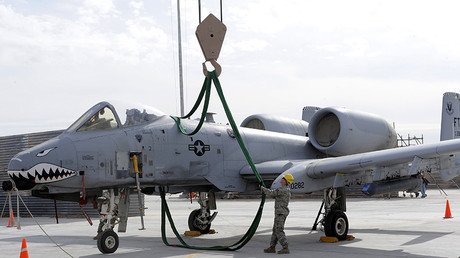Pentagon's ‘self-defense’ means war anywhere, any time. But there's a call to regulate war powers

A post-9/11 act grants the president authority to wage foreign wars with few restrictions. However, Democrats want the Pentagon to explain a lesser-known policy that allows the military to strike almost anywhere, at any time.
Passed easily in the aftermath of the 9/11 terrorist attacks, the Authorization for Use of Military Force (AUMF) streamlines the usual requirement that the president seek congressional approval to wage war, allowing him to use all “necessary and appropriate force” against anyone he decides “planned, authorized, committed or aided” the 9/11 attacks.
Since its passing, the AUMF has been invoked 37 times to allow US military action in countries including Afghanistan, Iraq, Syria, Somalia and Yemen. The global presence of extremist groups like al-Qaeda means that wherever the US wants to get involved, there’ll more than likely be someone there connected in some way with 9/11, giving intervention the green light.
But what about those other times? The US has a presence in over 150 countries worldwide, and surely can’t just open fire willy-nilly in these countries?
Well, sometimes it can - under the Department of Defense’s policy of ‘collective self-defense.’ According to the DoD, this policy authorizes US forces to intervene “with necessary and appropriate force” to defend “foreign or irregular partner forces” from attack, no matter whether the attacker poses a threat to the United States or not.
In a letter to Defense Secretary James Mattis sent Tuesday, Virginia Senator Tim Kaine (D) called the policy “a broad and troubling interpretation” of the president’s war powers, and called on the Pentagon to list its “partner forces” around the world.
Kaine asked whether these partners are vetted to ensure they abide by the Geneva Conventions, who approves the partnership, and how the use of force against their enemies is decided on.
‘Collective self-defense’ was used in Khasham, Syria in February, when US forces pounded Syrian government forces with air and artillery strikes, killing scores of Syrians and allegedly as many as 100 Russian mercenaries. The blitzkrieg was launched after Syrian government forces attacked the headquarters of US-backed opposition fighters in the area. The Syrian soldiers posed no threat to the United States at the time, and were not connected with the 9/11 attacks, but ‘collective self-defense’ was invoked to rubber-stamp their annihilation.
‘War machine can’t run forever’: US military aircraft mishaps up nearly 40 percent over last 5 years
Likewise in Tongo Tongo, Niger, in October 2017. The US’ presence in the African country had gone mostly unnoticed until Islamic State-connected militants ambushed US Special Forces and Nigerien soldiers on a reconnaissance mission. The attack was eventually repelled, but not before four US soldiers lost their lives. While the soldiers naturally returned fire to save their own lives, President Trump told reporters afterwards that he did not “specifically” authorize the mission in Niger, nor would the Pentagon say what the scope of the mission actually was. The authorization to use force was not needed, as ‘collective self-defense’ took care of that.
“I am alarmed that the Department of Defense believes that, by merely designating a group as a partner force, it can respond with military action to protect that partner force,” Virginia Senator Tim Kaine (D) wrote in his letter to Mattis.
Despite his concerns about expanding war powers, Kaine has also sponsored a bipartisan bill to replace the 2001 AUMF. The bill, introduced earlier this year, would define ‘opposition’ and ‘partner’ forces, would repeal the 2002 Iraq War authorization, and would codify the existing conflicts covered by the AUMF into law. Basically, Kaine is fine with the US lending its support to partners, but only with legal backing.
However, the bill would go further than the 2001 Act by enabling the president to declare war simply by giving Congress 48 hours’ notice, expanding the list of people who could be subjected to indefinite detention without trial, and allowing for the targeted assassination of enemies, even within the US.
Kaine’s bill is co-sponsored by Republican Senator Bob Corker (Tennessee), and was introduced this April. Expanding the ‘forever war’ is, seemingly, one of the few things Democrats and Republicans can agree on.
Like this story? Share it with a friend!
















